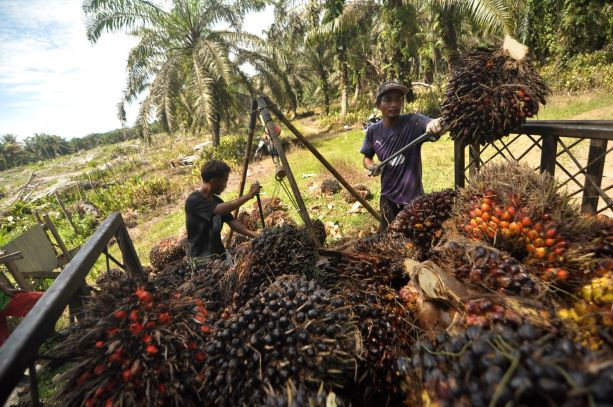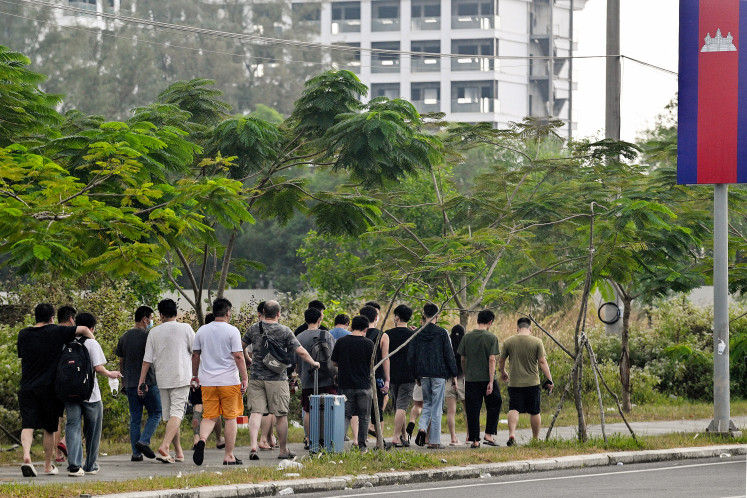Popular Reads
Top Results
Can't find what you're looking for?
View all search resultsPopular Reads
Top Results
Can't find what you're looking for?
View all search resultsBeing a 'bright spot' is not enough
GDP never provides the big picture of a country's economic or social wellbeing, and we should remember that before tooting our own horn too loud.
Change text size
Gift Premium Articles
to Anyone
I
nflation has been slowing steadily since September last year, investment is holding up well and the latest GDP report beat expectations. No two ways about it, Indonesia is standing strong in a turbulent global economy fraught with risks stemming from indebted banks to geopolitical upheaval.
As Statistics Indonesia (BPS) announced last Friday, the country’s GDP was up 5.03 percent year-on-year (yoy) in the January-March period, marking marginal acceleration from the 5.01 percent annual gain booked the preceding quarter. With the latest reading, our economic growth rate has stood above the psychologically significant 5 percent threshold for six quarters in a row.
The administration of President Joko “Jokowi” Widodo, which has made downstream industries a cornerstone of national development, deserves a lot of credit for its handling of the economy, while prudent fiscal planning helped the country emerge from the global coronavirus crisis without the debt that now encumbers governments, firms and individuals elsewhere.
Where there is praise, however, there is also a danger of pride, all the more so when an election is not far off. Praise is in order, but pride would be misplaced, for one simple reason: Pride would be mockery in the eyes of the millions of people who could not care less about the GDP data because they have yet to feel it.
Some subscribe to the economic concept of wealth trickling down from the rich to the poor, or from major corporations to small businesses, but until any such effect takes place, many will be buried or bankrupt.
Countless books have been written about the limitations of GDP as a measure of welfare, and this is a good opportunity to remind ourselves of those limitations, lest we get carried away over the shining stats.
In its first-quarter GDP report, BPS notes that all business sectors grew on an annual basis, but none as much as the transportation and warehousing sector, thanks to a massive yoy increase in expenditure on rail and air travel. Whether that reflects increased welfare is doubtful, however, as transportation prices, especially airfares, have also risen sharply.
The GDP data does not indicate how deep people are digging into their pockets to afford the things they buy.
GDP aims to capture economic output, or the aggregate production of goods and services in a country. As such, it fails to take into account the damage to people’s property or health caused by natural disasters or environmental destruction.
None of this is meant to detract from the positive picture reflected in Indonesia’s macroeconomic data, but we must bear in mind that this is never a complete picture of the economic wellbeing of Indonesia, or any other country
As helpful as GDP growth and inflation are to get a snapshot of an economy, a holistic assessment of welfare requires keeping an eye on other metrics too, such as wealth distribution, health and education, peace and security.
Wealth distribution also warrants a critical look at regional disparities within the archipelago, which remain immense. Aside from the aforementioned growth of downstream industries, helping the underdeveloped catch up has been high on the government agenda ever since Jokowi assumed office in 2014, but progress on this front has arguably been less impressive.
Access to public health and nutrition has improved substantially, though not enough, while serious deficiencies remain when it comes to providing quality and affordable education.
Indonesia’s Vision 2045, as defined by the National Development Planning Agency, aspires for the country to be a sovereign, advanced, fair and prosperous country by the time it celebrates its independence centenary. This shows that the administration understands that national development is about so much more than GDP.
We need to remember that whenever we hear about Indonesia being a bright spot in the global economy. We truly are, but this is not enough.











